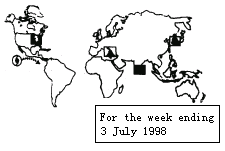
题目列表(包括答案和解析)
| |||||||||||||||||||||||||||||||||||||||||||||||||||||||||||||||||||||||||||||||||||||||||||||||||||||||||||||||||||||||||||||||||||||||||||||||||||||||||||||||||||||||||||||||||||||||||||||||||||||||||||||||||||||||||||||||||||||||||||||||||||||||||||||||||||||||||||||||||||||||||||
Do you know blood types?
Special care must be taken in selecting new blood for a badly injured person, who would be killed by the transfusion (输血) if the blood is too different from his own.
There are four basic types of blood A. B. A B. and O. Blood type, like hair and height, comes from parents. Basically, A and B can not be mixed. AB, sometimes called the universal recipient (万能受血者), may receive A or B,. O type, often called the universal donor (万能输血者), gives his blood to any other group. Patients usually receive nothing, but salt or plasma (血浆) until their blood can be matched as exactly as possible in the blood bank of a hospital. There is a relationship between your blood type and your nationality (国籍). Among Europeans, about 42 % have type A while 45 % have type O. The fewest is the type B.
【小题1】Which of the following show the correct relationship in blood transfusion ("→"means giving blood to...)?



| A. | B. | C. | D. |
| A.after he receives salt and plasma | B.before he feels uncomfortable |
| C.when the new blood fits his body | D.as soon as accident happens |
阅读理解
EARTH WEEK-A DIARY OF THE PLANETEnduring Storms
Several more rounds of severe storms, tornadoes and flash flooding struck many parts of the American Midwest and Northeast as bad weather continued across the US for a second month.
Monsoon Storms
A south-west monsoon has caused havoc in parts of SriLanka. Government meteorologists said that unexpected monsoonal winds blew directly across the country from the Southern Hemisphere at about 100 km/h, producing several rounds of stormy weather. Nearly 250 houses in the capital Colombo were damaged.
For the week ending 3 July 1998

Mt. Etna Erupts
Sicily’s Mount Etna volcano erupted shortly after midnight on July 1, shooting“bombs”of lava nearly 1.5 metres in diameter on the eastern side of the mountain. The 30-minute eruption could be seen for several miles, but did not threaten any nearby villages.
Hurricane
Hurricane Blas lost strength as it moved over cooler waters in the Pacific Ocean to the west of Mexico. Blasformed off southwest Mexico during the previous week, but squalls on the outer fringes of the storm lashed western Michoacan State, killing four people when their wood and cardboard home collapsed.
Monkey Repellent
After years of unsuccessful attempts to keep crop-eating monkeys out of Japanese fields, a Tokyo research team believes that it may have finally found a way to prevent the damage caused by the monkeys. Animal raids on crops were successfully prevented by shooting chilli powder into the air, irritating the eyes and noses of monkeys that passed in front of carefully-placed warning sensors.“We’ve tried…all kinds of preventive measures, but the monkeys are smart enough to outwit the tricks,”said Toshiaki Wada, Director of the Tokyo Forestry Experiment Station in western Tokyo.
1.The monsoon is Sri Lanka ________.
[ ]
A.was of average strength
B.destroyed more property than previous monsoons
C.was not typical for that time of the year
D.affected only the outer areas of the nation
2.What aspect of Hurricane Blas does the map show?
[ ]
3.According to the information, which of the following statements is TRUE?
[ ]
A.The eruption of Mt. Etna lasted thirty days.
B.Hurricane Blas was formed off the coast of Italy.
C.The American Midwest had fine weather throughout July 1998.
D.The eruption of Mt. Etna did not destroy local villages.
4.According to the information, the monkeys in the Japanese fields ________.
[ ]
A.destroy crops
B.kill unsuspecting humans
C.spread eye diseases to humans
D.stop farmers from working
5.Toshiaki Wada, Director of the Tokyo Forestry Experiment Station, would describe the monkeys as ________.
[ ]
Do you know blood types?
Special care must be taken in selecting new blood for a badly injured person, who would be killed by the transfusion (输血) if the blood is too different from his own.
There are four basic types of blood A. B. A B. and O. Blood type, like hair and height, comes from parents. Basically, A and B can not be mixed. AB, sometimes called the universal recipient (万能受血者), may receive A or B,. O type, often called the universal donor (万能输血者), gives his blood to any other group. Patients usually receive nothing, but salt or plasma (血浆) until their blood can be matched as exactly as possible in the blood bank of a hospital. There is a relationship between your blood type and your nationality (国籍). Among Europeans, about 42 % have type A while 45 % have type O. The fewest is the type B.
1.Which of the following show the correct relationship in blood transfusion ("→"means giving blood to...)?




A. B. C. D.
2.Usually person who has been injured and lost too much blood should be given a blood transfusion______.
A.after he receives salt and plasma B.before he feels uncomfortable
C.when the new blood fits his body D.as soon as accident happens
3.From this passage we can know that among Europeans ______ 13 % have the type B.
A. about B. no more than C. less than D. at most
| |||||||||||||||||||||||||||||||||||||||||||||||||||||||||||||||||||||||||
湖北省互联网违法和不良信息举报平台 | 网上有害信息举报专区 | 电信诈骗举报专区 | 涉历史虚无主义有害信息举报专区 | 涉企侵权举报专区
违法和不良信息举报电话:027-86699610 举报邮箱:58377363@163.com